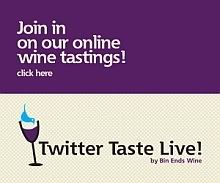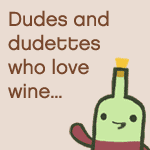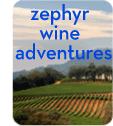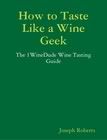 Dude's been dabbling in the art of interpreting website traffic results, and noticed in the process that lots of folks are finding the 1WineDude blog while searching for advice on the CSW (Certified Specialist of Wine) exam.
Dude's been dabbling in the art of interpreting website traffic results, and noticed in the process that lots of folks are finding the 1WineDude blog while searching for advice on the CSW (Certified Specialist of Wine) exam.
Well, Dude has passed this exam and he is here to help!
I've written before on this topic, offering CSW exam advice based on how I nearly totally screwed myself on the exam due to my poor prep. work. So I thought I'd offer some advice about the exam itself (without giving you any actual questions, of course... shame on you for thinking that!). I'm assuming that most of you out there contemplating the CSW are already wine lovers, or industry types who have opportunity to taste wine, and so you're probably already cool with wine varietal taste profiles and the like. That's good - because the exam will test you on your knowledge of those elements. But what else do you need to be an 'A' student? Cue the Sam Cooke tunes... Don't Know Much About History...
Don't Know Much About History...
There's a surprising amount of wine history that is fair game for inclusion on the exam. Unfortunately, this means that you will need to know some fairly obscure facts about wine-related names and dates. Concentrate on the people who were the "founding fathers" of modern wine cultivation and/or wine production in today's major wine-producing areas (South Africa, California, etc.). Look at it this way: if nothing else, it's an opportunity to impress party-goers at your next wine gathering, or get a leg up in a wine trivia drinking game.
Don't Know Much About Geography...
You will need to be very comfortable with geography in order to do well on the exam. And because the Society of Wine Educators (SWE, who administer the exam) are based in the U.S., the CSW seemed to me to favor California geography questions over "Old World" (France, Germany, Italy) geography questions. You will need to know your CA wine geography. Having said that, remember that obscure the "Old World" geography questions are fair game, and other questions about varietals, styles, etc., are sometimes phrased in terms of geography (e.g., "a famous wine from the southern area of country X is...").
...don't ignore
the History, Geography and Chemistry of wine
for the CSW exam...
The most surprising aspect of the CSW exam, at least for me, was the healthy concentration of wine chemistry questions. Dude didn't much care for Chemistry class when he was in high school, but he found the chemistry material in the on-line SWE Wine Academy to be fascinating. Good thing, too, because there will almost certainly be wine chemistry questions waiting for you on exam day (as there were for me). Some areas where it may help to concentrate your study time: Bacteria and wine faults, chemical composition of wine (both in the raw materials like grapes & skins, and in the finished product), and the uses of chemicals like sulfites in viniculture.
I hope this was a useful list for all of you CSW hopefuls out there. You can always contact the Dude if you're looking for more advice. Good luck - and don't forget your #2 pencils.
Cheers!
How to Pass the CSW Exam: More Advice from the 1WineDude
CSW Exam Don'ts
 Happy New Year and greetings from my "snowbird" vacation to southern FL!
Happy New Year and greetings from my "snowbird" vacation to southern FL!
I was recently contacted by Kathleen Lisson, a fellow Certified Specialist of Wine (CSW) and Wine Century Club member. Kathleen has started a blog post about tips and approaches for studying for the challenging CSW exam, and asked me to participate by adding my studying tips.
I've written about the CSW and other wine certifications before, but had not really detailed my CSW experience. I nearly botched the approach to the CSW exam completely, so I thought I'd write a post in response to Kathleen's request, so that any readers out there who are contemplating sitting the CSW exam have an idea of what not to do to pass it...
First, a bit of background: I put off the CSW exam for nearly a year. I had intended to sit the exam in Philadelphia in April, and life "got in the way" as they say. Because the Society of Wine Educators (who oversee the exam and certification) administer the exams throughout the U.S., I needed to wait until they sat another CSW exam close to home. That meant waiting until October to take the exam in D.C.
I never ordered the CSW study materials from the SWE. October was fast approaching, and I'd not studied consistently since April. I was definately setting the stage for being totally screwed on this exam.
At the 11th hour, I got a bit smarter about my approach: as a paid member in good standing of the SWE, I had access to their on-line wine academy, which has excellent information and practice exams for the CSW. I crammed, hitting the on-line wine academy hard, taking every pre- and post-test and the CSW practice exam. I took notes along the way and highlighted the areas that gave me trouble during the practice tests, and revisited those to make sure I was more comfortable with that material prior to the exam.
I had one other decent idea before the big exam day arrived: the weather forecast for D.C. was excellent, so I treated my wife to a stay in D.C. (using hotel points). We had dinner at the same restaurant where the CSW (and the more difficult Certified Wine Educator exam) was being held the next day, so I could get familiar with the exam area. So we were able to take a potentially stressful situation and have some fun with it, which dialed down the stress considerably for me.
Come exam day, I felt great, well-fed, and well-rested (being able to sleep just a block or two away at a nice hotel). Unfortunately, the exam started late due to a fire at the SWE building location, but thanks to my low stress level that didn't phase me too much. When I received my exam results a few weeks later, I was flabbergasted - I did not just pass, but did really well.
I suppose the moral of this story is, if you're going to sit the CSW:
Cheers!


























